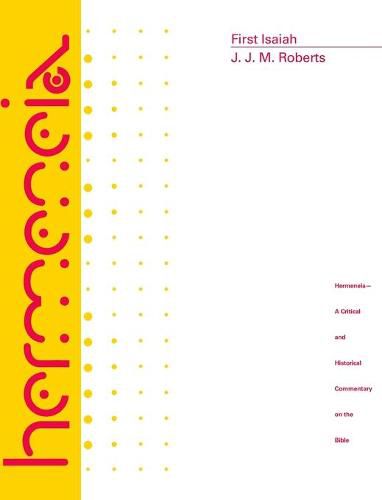Readings Newsletter
Become a Readings Member to make your shopping experience even easier.
Sign in or sign up for free!
You’re not far away from qualifying for FREE standard shipping within Australia
You’ve qualified for FREE standard shipping within Australia
The cart is loading…






The eighth century BCE Isaiah of Jerusalem, the so-called First Isaiah, is one of the most important theological voices in the Bible. J. J. M. Roberts takes a classical historical-critical approach to his interpretation of this material, making good use of his broad comparative knowledge of ancient Near Eastern historical and religious sources. In light of Isaiah’s very long prophetic ministry of at least thirty-eight years, and perhaps as long as fifty-three years, Roberts also suggests Isaiah often reedited older oracles from early in his ministry to address new, though somewhat analogous situations, albeit with different players, later in his ministry, without erasing telltale signs of the material’s earlier origin. In many cases, this suggestion provides a better explanation for glaring inconsistencies in an apparently connected text than the common fragmentation of the text that attributes such inconsistencies to later editors who either misunderstood or intentionally altered Isaiah’s message for their own purposes.
$9.00 standard shipping within Australia
FREE standard shipping within Australia for orders over $100.00
Express & International shipping calculated at checkout
The eighth century BCE Isaiah of Jerusalem, the so-called First Isaiah, is one of the most important theological voices in the Bible. J. J. M. Roberts takes a classical historical-critical approach to his interpretation of this material, making good use of his broad comparative knowledge of ancient Near Eastern historical and religious sources. In light of Isaiah’s very long prophetic ministry of at least thirty-eight years, and perhaps as long as fifty-three years, Roberts also suggests Isaiah often reedited older oracles from early in his ministry to address new, though somewhat analogous situations, albeit with different players, later in his ministry, without erasing telltale signs of the material’s earlier origin. In many cases, this suggestion provides a better explanation for glaring inconsistencies in an apparently connected text than the common fragmentation of the text that attributes such inconsistencies to later editors who either misunderstood or intentionally altered Isaiah’s message for their own purposes.